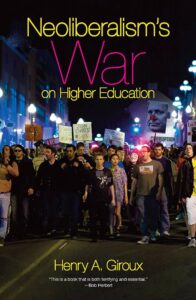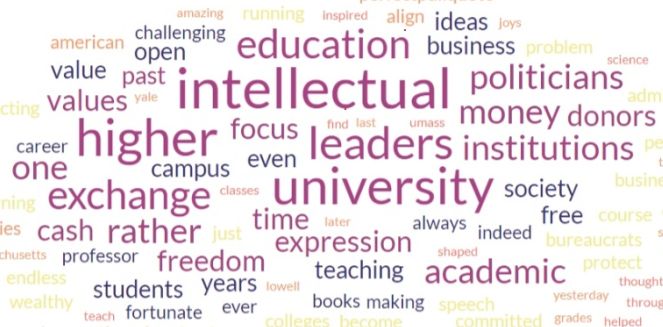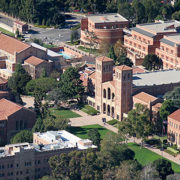Ending the neoliberal dismantling of higher education is possible. But for that to happen, academic leaders must be willing to see themselves as scholars and their institutions as intellectual communities.
Yesterday, I submitted grades for the last time as a professor at the university where I’ve taught for the past 23 years. Teaching has always been one of the joys of being an academic, and I was fortunate to have some amazing professors as an undergraduate at the University of Massachusetts Lowell, and later at Yale and the University of Pittsburgh. They inspired me and have shaped my thoughts on teaching and intellectual endeavors throughout my career.
Indeed, the always challenging debates in my political science classes at UMass helped me find a love for the contemplative lifestyle and the academy. Overall, I have been fortunate to teach students who are interested and challenging in a good way. I continue to write and publish, much as I did before taking the retirement plunge.
I’m not truly retiring. I have teaching gigs lined up and two books under contract. It’s likely I will be busier than ever while making less money, which is just fine. In my early sixties, I was under no pressure to retire. I still enjoy spending time on college campuses, and I admire and appreciate the world of scholarship and the value of intellectual exchange, despite academia’s many warts.

Courtesy Haymarket Books
So, why did I pack it in? The question can be answered in one word: Neoliberalism. It’s not simply that campus bureaucrats have multiplied like rabbits as they endeavor to turn colleges and universities into businesses. It’s not just that they continually hire more of their ilk to ensure that institutions of higher learning become institutions of higher earning. And it’s not even that those same bureaucrats waste the time of faculty and students with meaningless paperwork.
The problem is that that same explosion of administrative “leaders” and their attached cadres of minions has been eroding the intellectual community as they focus their attention on money and prestige rather than on research and learning. That proclivity is evident in the endless concern over rankings and … as has been apparent over the past few months … how university presidents make sure they don’t offend donors or politicians rather than being intellectual leaders who protect key values in a democratic society, such as academic freedom and free speech.
Indeed, higher education administrators focus on running “the business” of their institutions and keeping “investors” happy rather than being courageous intellectual leaders committed to freedom of inquiry and speech.
Of course, running the administrative side of the organization is essential. But colleges and universities are not businesses primarily. First and foremost, they are institutions dedicated to free expression, and leaders’ priorities should focus on protecting the open exchange of ideas—even when some of those ideas irritate wealthy donors and ideologically committed politicians.
The orientation and actions of which I speak reflect our society as a whole where money is God, and where many people believe that financially supporting a university should bring some say or power in what that institution does. When a wealthy donor gives a pile of cash, they should view it as a means to create contexts for intellectual exchange and expression, not about having control over exchange and expression.
When donors threaten to pull their cash because they don’t like what’s being said on campus, they really tell us that the campus should represent their perspectives and should not allow space for other perspectives. The same problem exists for politicians when they seek to kill tenure (designed to protect academic freedom) when what is being expressed doesn’t align with their own particular ideological leanings.
So, that is why I retired. A healthy democracy needs a reliable higher education system—particularly public higher education–and I need to do my work in a context that is protected and values open debate and discussion. Instead, I have seen one of the most extraordinary systems of higher education ever developed eroded by endlessly expanding bureaucracies, meddling politicians, and a steady shift from the notion of the university as a bastion of free exchange to one in which the university is viewed as a business focused on the generation of cash to support ever-expanding bureaucracies.
Of course, as noted above, what I describe reflects American society. America today is about money and not much else. It seems that most things are reduced to cash value, and Americans devote a great deal of time to quantifying themselves and others in terms of their “net worth,” which is simply a way to reduce one’s humanity to a dollar sign.
While none of that is new–even if it has become increasingly pernicious over the past fifty years–I chose a life in higher education partly because I thought it was one way to counter society’s persistent “moneyfication.” Academia represented a space where other values, including intellectual exploration, curiosity, beauty, and morality, seemed to outweigh the endless American focus on the bottom line.
Unfortunately, that possibility has faded over the years.

Wordcloud of this commentary generated by https://www.freewordcloudgenerator.com/
As I end my career as a professor, I encourage academic leaders to be intellectual leaders rather than business people. Give thought to other values and how they form the core of what a university is about. When making decisions, talk about what’s right rather than how it might “add value,” “leverage this or that,” and attract students. Think about your role in protecting spaces where freedom of expression and open exchange of ideas can flourish, and how that work is far more important than satisfying donors and politicians in the quest to secure more money.
Ending the neoliberal dismantling of higher education is possible. But for that to happen, academic leaders must be willing to see themselves as scholars and their institutions as intellectual communities.
________
Cover photo, courtesy The Guardian



